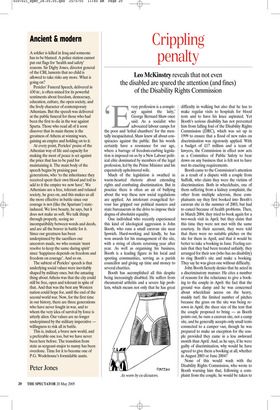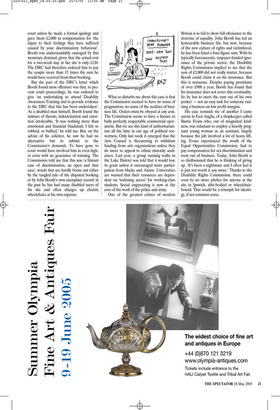Crippling penalty
Leo McKinstry reveals that not even the disabled are spared the attention (and fines) of the Disability Rights Commission ‘Every profession is a conspiracy against the laity,’ George Bernard Shaw once said. As a socialist who advocated labour camps for the poor and ‘lethal chambers’ for the mentally incapacitated, Shaw knew all about conspiracies against the public. But his words certainly have a resonance for our age, where a barrage of freedom-curbing legislation is imposed on us by a New Labour political elite dominated by members of the legal profession, led by the Prime Minister and his expensively upholstered wife.
Much of the legislation is swathed in warm-hearted rhetoric about extending rights and combating discrimination. But in practice there is often an air of bullying about the way these new social regulations are applied. An intolerant evangelical fervour has gripped our political masters and state bureaucrats in the drive to impose their dogma of absolutist equality.
One individual who recently experienced this kind of ideological aggression is John Booth, who runs a small caravan site near Ipswich. Hard-working and kindly, he has won awards for his management of the site, with a string of clients returning year after year. As well as organising his business, Booth is a leading figure in his local and sporting communities, serving as a parish councillor and giving up time and money to several charities.
Booth has accomplished all this despite being increasingly disabled. He suffers from rheumatoid arthritis and a severe hip problem, which means not only that he has great difficulty in walking but also that he has to make regular visits to hospitals for blood tests and to have his knee aspirated. Yet Booth’s serious disability has not prevented him from falling foul of the Disability Rights Commission (DRC), which was set up in 1999 to ensure that a flood of new rules on discrimination was rigorously applied. With a budget of £17 million and a team of lawyers, the Commission in effect now acts as a Committee of Public Safety to bear down on any business that is felt not to have met its exacting requirements.
Booth came to the Commission’s attention as a result of a dispute with a couple from Suffolk, who claim they were the victims of discrimination. Both in wheelchairs, one of them suffering from a kidney complaint, the other from multiple sclerosis, these complainants say they first booked into Booth’s caravan site in the summer of 2003, but had to cancel because of health problems. Then, in March 2004, they tried to book again for a two-week visit in April, but they claim that this time they were not met with the same courtesy. In their account, they were told that there were no suitable pitches on the site for them in April, and that it would be better to take a booking in June. Feeling certain that they had been treated unfairly, they arranged for their son (who has no disability) to ring Booth’s site and make a booking. They say he was given one without difficulty.
John Booth fiercely denies that he acted in a discriminatory manner. He cites a number of reasons for the reluctance to give a booking to the couple in April: the fact that the ground was damp and he was concerned about wheelchair access on the heavy, muddy turf; the limited number of pitches because the grass on the site was being resown in April; the sheer size of the tent that the couple proposed to bring — as Booth points out, he runs a caravan site, not a camp site, and he generally accepts only small tents connected to a camper van, though he was prepared to make an exception for the couple provided they came in a less awkward month than April. And, as he says, if he were guilty of discrimination, why would he have agreed to give them a booking at all, whether in August 2003 or June 2004?
None of this would wash with the Disability Rights Commission, who wrote to Booth warning him that, following a complaint from the couple, he would be taken to court unless he made a formal apology and gave them £2,000 in compensation for ‘the injury to their feelings they have suffered caused by your discriminatory behaviour’. Booth was understandably outraged by this monetary demand, given that the actual cost for a two-week stay at the site is only £120. The DRC had therefore ordered him to pay the couple more than 15 times the sum he would have received from their booking.
But the part of the DRC’s letter which Booth found most offensive was that, to prevent court proceedings, he was ordered to give ‘an undertaking to attend Disability Awareness Training and to provide evidence to the DRC that this has been undertaken’. As a disabled man himself, Booth found the mixture of threats, indoctrination and extortion intolerable. ‘It was nothing more than emotional and financial blackmail. I felt so robbed, so bullied,’ he told me. But, on the advice of his solicitor, he saw he had no alternative but to submit to the Commission’s demands. To have gone to court would have involved him in even higher costs with no guarantee of winning. The Commission told me that this was ‘a blatant case of discrimination, an open and shut case’, words that are hardly borne out either by the tangled tale of the disputed booking or by John Booth’s own exemplary record: in the past he has had many disabled users of his site and often charges up electric wheelchairs at his own expense. What so disturbs me about this case is that the Commission seemed to have no sense of pragmatism, no sense of the realities of business life. Orders must be obeyed at any cost. The Commission seems to have a licence to bully perfectly respectable commercial operations. But we see this kind of authoritarianism all the time in our age of political correctness. Only last week it emerged that the Arts Council is threatening to withdraw funding from arts organisations unless they do more to appeal to ethnic minority audiences. Last year, a group running walks in the Lake District was told that it would lose its grant unless it encouraged more participation from blacks and Asians. Universities are warned that their resources are dependent on ‘widening access’ for working-class students. Social engineering is now at the core of the work of the police and army.
One of the greatest crimes of modern Britain is to fail to show full obeisance to the doctrine of equality. John Booth has led an honourable business life, but now, because of the new culture of rights and victimhood, he has been fined a four-figure sum. With its typically bureaucratic, taxpayer-funded ignorance of the private sector, the Disability Rights Commission implied to me that the sum of £2,000 did not really matter, because Booth could claim it on his insurance. But this is nonsense. Despite paying premiums of over £900 a year, Booth has found that his insurance does not cover this eventuality. So he has to meet the sum out of his own pocket — not an easy task for someone running a business on low profit margins.
His case reminds me of another I came across in East Anglia, of a shopkeeper called Barrie Evans who, out of misguided kindness, was reluctant to employ a heavily pregnant young woman as an assistant, largely because the job involved a lot of heavy lifting. Evans experienced the wrath of the Equal Opportunities Commission, had to pay compensation for sex discrimination and went out of business. Today, John Booth is so disillusioned that he is thinking of giving up. ‘It’s been a nightmare and I often feel it is just not worth it any more.’ Thanks to the Disability Rights Commission, there could soon be no more pitches for anyone at the site in Ipswich, able-bodied or wheelchairbound. That would be a triumph for ideology, if not common sense.























































 Previous page
Previous page